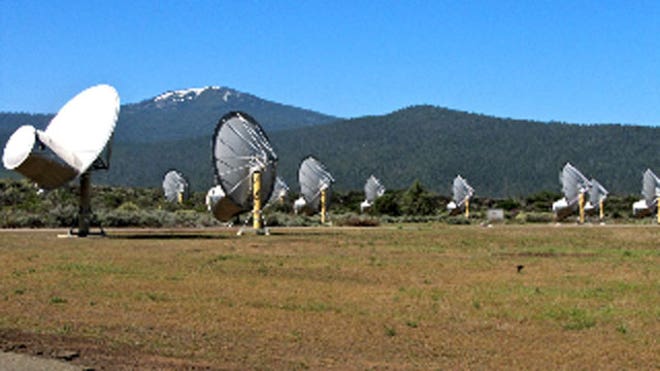SETI project: We're listening again, ET
By Paul Rogers
progers@mercurynews.com
Posted: 08/11/2011 03:32:05 PM PDT
Updated: 08/11/2011 03:40:49 PM PDT
E.T., you can phone home again.
Forty-two radio telescope dishes near Mount Shasta will again start listening for sounds of intelligent life in the universe this fall after donors -- including actress Jodie Foster -- came up with more than $200,000 to save the Mountain View-based SETI program, made famous by the movie "Contact."
The Allen Telescope Array was shut down in April when the SETI (Search of Extraterrestrial Intelligence) Institute ran short of of money for the project.
The non-profit organization, which was founded in 1985 and funded in the 1990s by Hewlett Packard co-founder David Packard, said the $210,000 in donations it has raised this summer will allow the radio antennas to be turned back on by September. They will be re-calibrated and operated 24 hours a day through the end of 2011 while the organization continues to raise funds.
"My reaction is gratification and astonishment. Economic times are tough," said Seth Shostak, senior astronomer at the SETI Institute. "But people still think this very fundamental question -- is there somebody out there as intelligent or more so than us? -- is important and worth doing.
"There is something very quintessentially American about it," Shostak added. "There's something in our culture about being willing to try long-shot but high-stakes experiments in the name of exploration."
The idea of monitoring radio waves from space to look for patterns that could indicate intelligent life has been around for more than 100 years. Pioneering work was done by Cornell astronomer Frank Drake, now a Santa Cruz County resident, starting in the early 1960s. Carl Sagan and other researchers were advocates, but for years its adherents had problems obtaining significant time on telescopes to do their work and were at times derided by other astronomers.
In 2007, after Microsoft co-founder Paul Allen donated $30 million, the Allen Array was constructed and turned on. The project, the largest radio telescope array in the world devoted primarily to SETI research, was originally a joint effort of the SETI Institute and the UC-Berkeley Radio Astronomy Laboratory.
But this year, UC pulled out of the arrangement, after state budget cuts and the loss of several National Science Foundation grants reduced funding.
The SETI Institute has 140 employees and an $18 million annual budget, which comes from private donors, NASA and the National Science Foundation. It works on a range of topics, including studies of Jupiter's moons, the search for water on Mars and others.
Running the Allen Telescope Array at full staffing of about 10 people costs $2.5 million a year. The SETI Institute is in discussion with the U.S. Air Force to use the telescopes to help track space debris and satellites.
The hope, said SETI Institute CEO Tom Pierson, in a letter to supporters this spring, is to raise $5 million so that SETI astronomer Jill Tarter can lead a new effort to point the radio dishes at the 1,235 new "exoplanets" that were announced in February by NASA's Kepler mission.
Those planets are newly discovered planets in other solar systems, many of which could be rocky, and located in the "habitable zone" -- not too close or too far from other suns so that they could support water, and perhaps life.
Actor Jodie Foster played Tarter in the 1997 movie "Contact." Adapted from a book by Sagan, the film explored what might happen if SETI researchers found a pattern amid the background noise of the universe that indicated intelligent life, similar to the radio and TV signals that have been broadcast from earth for the past century.
"In Carl Sagan's book/movie 'Contact,' a radio signal from a distant star system ends humanity's cosmic isolation and changes our world," Foster wrote in a message with her donation. "The Allen Telescope Array could turn science fiction into science fact, but only if it is actively searching the skies. I support the effort to bring the array out of hibernation."
Other prominent donors this summer include Larry Niven, author of the "Ringworld" science fiction series, and Bill Anders, a former Apollo 8 astronaut.
"It is absolutely irresponsible of the human race not to be searching for evidence of extraterrestrial intelligence," Anders wrote with his donation.
In addition to monitoring electromagnetic waves, the Allen array also studies magnetic fields in the Milky Way, hydrogen gas patterns that could offer information about dark energy, and black holes, pulsars and star formation.
Bob Sanders, a spokesman for UC-Berkeley, said new technology developed at the site can be used to help link large numbers of radio antennas together at other observatories in the world. Even though the $210,283 in new donations is only a fraction of the funding needed, the news is positive, he said.
"It's a great resource up there," he said of the site, which has very little interference from radio stations or power lines. "It's a very radio quiet area and a great research location."
Contact Paul Rogers at 408-920-5045.




 Reply With Quote
Reply With Quote



 Cannot play media. You do not have the correct version of the flash player.
Cannot play media. You do not have the correct version of the flash player. 
Bookmarks